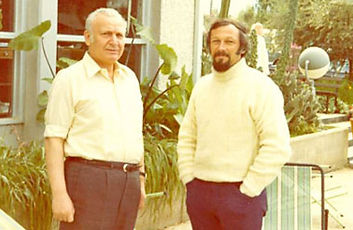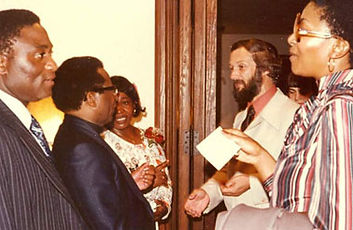Alan Walton
SCIENTIST / VENTURE CAPITALIST / ADVENTURER

Walton and President of Israel, Ephraim Katzir, discussing the commercialization of science in 1975.

Bishop Muzorewa (center glasses), Head of the United African National Council of Zimbabwe greeting guests in Salisbury (now Harare) 1977.
Politics
In 1976 Alan worked with the science task force for Governor Carter on the Formulation of Science Policy. Following Jimmy Carter’s election, Alan worked on technology transfer issues including a round-the-world tour meeting with chief science officers to governments in England, India, Israel, Rhodesia and South Africa.
This tour led to several publications including “Are We Backing the Wrong Side in Rhodesia” - Cleveland Plain Dealer (Thursday, February 16, 1978), which postulated that moderates, such as Bishop Muzorewa, might be more reliable allies than the
Mugabe’s forces often committed tortures in their “freedom” fight for Zimbabwe,
most of which are too horrible to show. One favorite was to cut off the lips and ears of government collaborators and have their family cook and eat them.
Many felt Bishop Muzorewa should have been president of Zimbabwe after its independence. Muzorewa escaped several assassination attempts during and after the election. Alan and others purchased a bullet proof jacket for him.
Finally, Alan’s group submitted papers to the White House suggesting that technology transfer might best be handled by universities themselves. This idea eventually led to the formulation and passing of the Dole-Bayh bill which many credit with catalyzing the formation of the biotechnology industry.
2008 - Served as a Science Policy Committee member for Barack Obama prior to his election with particular responsibility for promotion of science, jobs and voter turnout
in Ohio.